Tom Kimmel Canadian Scholarship to DLI
Fabricare Canada Magazine established a partnership with the Dry Cleaning & Laundry Institute (DLI) many years ago to encourage Canadian industry people to get quality training and improve their operations as a result. Over the years, dozens of people have taken advantage of this scholarship to better themselves and their careers.
What does it include?
Scholarship recipients can choose to attend the Introduction to Dry Cleaning Course (5 days) or the Advanced Dry Cleaning Course (10 days), depending on their skill level. These are intensive, hands-on courses, and combine skills training with networking for lifelong industry connections.
Introduction to Dry Cleaning Course
The Five day Introduction to Dry Cleaning Courses held at DLI’s school in Laurel Maryland is geared toward individuals new to the industry or who have less than one year of experience.
Course covers:
- Sorting loads for dry cleaning
- Cleaning silk, satin and other fabrics
- Operating a dry cleaning machine
- Removing coffee, Ink, grease and other stains from clothing
- Pressing pants, coats, skirts
- Using tensioning equipment to improve finishing quality
This course would normally cost $1,595 US.
Advanced Dry Cleaning Course
This ten-day Advanced Dry Cleaning Course held at DLI’s school in Laurel Maryland is for individuals who have completed the Introduction Course or have hands-on production experience and knowledge of basic stain removal and finishing techniques.
The advanced course covers:
- Identifying cotton, silk, polyester and other fabrics
- Using bleaches without damaging the fabric color
- Pressing blouses, dresses, ties, pleated garments, silks, velvets, corduroy
- Wetcleaning wool, silk, and more
- Maintaining and changing filters
- Troubleshooting problems with the dry cleaning machine
- Using tensioning equipment to improve finishing quality
- Customer service techniques for dry cleaners
- Getting clean, white laundry
- Cleaning and preserving wedding gowns
- Understand the difference between solvents including perc, GreenEarth®, hydrocarbon and SOLVONK4
- Pressing laundered shirts
- Designing a dry cleaning plant with the most effective work flow
This course would normally cost $2,195 US.
What does the scholarship cover?
The scholarship covers the entire cost of the course, plus lunches each day. You would be responsible for your travel, housing, other meals and any excursions you decide to go on while you are there.
What are the criteria?
- You must speak English.
- You must be at least 18 years of age.
- You must be working in the fabricare industry in Canada, and have been doing so for at least 1 year.
- You must be able to cover the other costs involved (see above).
- You must be able to be away from your work for the required time for the course.
How to apply
Applicants are chose from those who apply, with one scholarship being given for each year.
To apply, send an email to Fabricare Canada Magazine publisher Becca Anderson (becca@fabricarecanada.com), giving your qualifications (see above) and reasons for wishing to attend the class. Comments from your supervisor are welcomed. Indicate which course you would like to attend, and when (they are held in spring and fall).
Scholarship winners will be notified in plenty of time to arrange their travel and other details. It is most appreciated if they write an article for the magazine about their experience once they return.
What scholarship winners have to say
“I traveled to Maryland for the 3-week course knowing nothing about dry cleaning and being completely dependent on my employees to run the business. After the first day’s class, I realized that it was one of the best choices that I have made in my life.” — Shashidhar Narasimha


“At the beginning of the week I thought I would be excited to head back to Toronto, but after completing the Intro course, I would have happily stayed for the next two weeks for the Advanced portion. The course gave me a renewed sense of pride for our industry. While our clients may think it’s just ‘laundry’, the original dry cleaners were chemists, and today it still requires knowledge, experience and attention to detail. Most of the time, the dry cleaning industry depends on knowledge transfer, or passing information from the experienced to the inexperienced. While I don’t doubt we’ve all had good teachers, there’s also a chance that people in your plant are doing a lot of things because ‘that’s the way it’s always been done’. Learning dry cleaning the ‘DLI way’ allowed me to reflect on our current practices and how they may be able to be improved.” — Linley McConnell
Scholarship Reflection
2025 DLI Scholarship Recipient
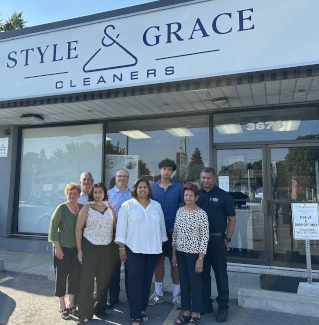
By Nadine Rana, Style & Grace Cleaners
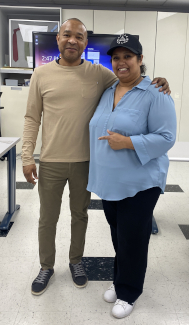
It’s truly difficult to put into words what it means to be chosen as the 2025 Fabricare Canada DLI Scholarship Recipient. I am deeply honored and grateful for this opportunity, and for the sense of community that continues to grow within our industry. The camaraderie among dry cleaning professionals is remarkable, and that shared momentum only strengthens when we take the time to learn from one another and build meaningful relationships as business owners.
My journey toward this scholarship began with something simple—reading Fabricare Canada. Like many owner-operators, I wear what feels like seventeen hats a day, and it’s easy to overlook the importance of staying connected to industry news. But I quickly learned that investing a few minutes to “be in the know” can open doors you never expected.
I first learned about the DLI scholarship when I saw a fellow colleague share their own experience as a past recipient. I was inspired, proud, and motivated to challenge myself by applying. To my surprise—and immense excitement—I was selected! I could hardly wait to book my flight to Maryland and begin a new chapter of learning at the Dry Cleaning & Laundry Institute.
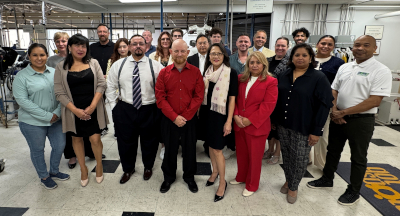
From the moment I arrived, I knew it would be an unforgettable week. I met classmates from across Canada, the U.S., and even as far away as Cambodia. Many were new to the industry, while others had transitioned from entirely different careers. What united us was a shared curiosity—a collective desire to learn the art and science behind garment care in a field often overlooked as “old world.”
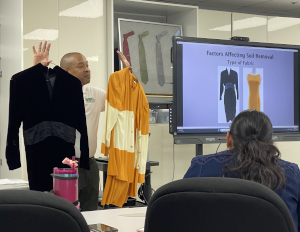
Under the expert instruction of Brian Johnson, our group learned far more than just theory. The program was thoughtfully designed to balance classroom learning with hands-on experience—from the spotting board to the utility press. I was in awe of the amount of planning, precision, and care that goes into a DLI training program. It reminded me that excellence in our craft requires both knowledge and practice, and that the best learning happens when we understand why behind each step.
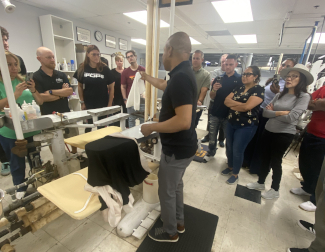
The DLI Institute itself stands as a testament to decades of dedication, innovation, and passion for elevating our profession. It’s one thing to observe how a dry cleaning operation functions, but it’s another to truly learn to do it right—and that’s what DLI offers. I’ve come to believe that if every cleaner invested in this kind of education for themselves and their staff, our industry would be viewed in an entirely new light: one defined by expertise, integrity, and pride in our craft.
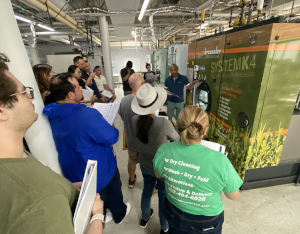
Completing the Introduction to Dry Cleaning course changed me. As a second-generation owner, it was a humbling and inspiring experience that broke down barriers I hadn’t even realized were holding me back. I left feeling proud—not just of my family business, but of the industry as a whole. I was reminded that success isn’t achieved in isolation; it grows from being surrounded by passionate mentors and peers who push you to dream bigger.
This may not be a glamorous profession, but it is one filled with purpose. There’s immense satisfaction in knowing that every day, we help people feel confident in their personal style, preserve memories, and uphold the legacy of a trade built on skill and trust.
To Fabricare Canada and everyone involved in making this scholarship possible—thank you. You’ve not only given me an opportunity to learn, but also to fall even more in love with this incredible industry.


